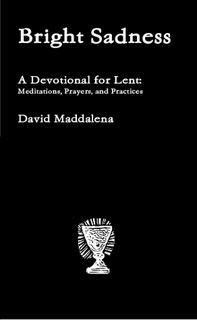![]()
![]()
Devotions for Lent

Ash Wednesday
Week One
Week Two
Week Three
Week Four
Week Five
Passion Week
Palm Sunday
Maundy Thursday
Good Friday
Easter

Bright
Sadness
the book
Bright Sadness
Several years ago I followed a fast through the forty days of Lent and found that it changed my view of Easter, and that it changed me. Fasting and meditating on my weaknesses helped me grasp the intense significance of the crucifixion, and gave me a deep and powerful longing for the resurrection, which then became joy on Easter Sunday. I was helped on this journey by materials from churches more Eastern and more traditional than my own.
These pages are to serve a similar purpose: to direct the Christian in preparation for Easter, through observance of Lent. While Easter is a popular holiday and may be the most important Christian holiday (next to Christmas), many of us have a pretty weak understanding of what it is all about. For example, Easter often sneaks up on us: we may not even think of it until the annual church brunch is announced. ...
Lent is the antidote to this oversight. In the Western churches (of the Protestant variety) we don't participate in Lent, historically speaking. We are more comfortable with the joy and celebration of Easter than with the darkness that preceded it. But Lent is a chance to remember the dark before the dawn, the sin that Jesus took to the cross. In the Orthodox Church, Lent is called the season of Bright Sadness, because it is a time of both celebration and mourning.
But you may well ask: why dwell on the darkness at all? After all, Jesus' work is done. Death has been conquered, Christ is victorious! The cross has answered it all; why should we be sad?
If the cross is the Answer,
what exactly is the Question?
Before Christ, the world called out to God (in the words of David, King of Israel),
"How long, O Lord? Will you be angry forever? Will your jealous wrath burn like fire?" —Psalm 79.5
Easter is the once-for-all-time answer to this question. Jesus took our place on the cross to appease God's righteous anger. He went alone to be punished: separated from God and deserted by his friends. The drama of how this happened is the story of Lent. ... Before the Resurrection comes crucifixion; before crucifixion comes prosecution; before prosecution comes betrayal, doubt, fear, rebellion, and sin.
Lent helps us experience our part in the Passion (suffering) of Jesus. We face our humanity during Lent: we learn that sin still dwells in us, that we still carry darkness. We learn that we, like his disciples, would likely have fallen asleep as Jesus prayed for deliverance in the garden, and, also, that we would likely have denied knowing him as he silently accepted his death sentence.
Consider the ways that you can remember your part in the passion play during this season of Lent. On the following pages you will find a calendar of Lent, and ways for adults and kids to participate. There are scripture readings and meditations to direct your heart to God, and suggestions for ways to fast.
The goal of this site is to increase your appreciation of Easter. But note: none of the practices discussed here are required for a Christian .... One thing is certain: Jesus' death and resurrection occurred "once, for all time", and you will do nothing this year to earn it. It is God's free and love-born gift to you.
Join Christians around the world in the Lenten pilgrimage: mourn for the darkness in our hearts; rejoice in the light of God who came into the world to save us!
To The Calendar ...

HOME | Lent Calendar | Kids | Fasting | Ash Wednesday | Week One | Week Two | Week Three | Week Four | Week Five | Passion Week | Palm Sunday | Maundy Thursday | Good Friday | Easter | Credits | Bright Sadness (the book)
